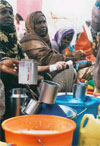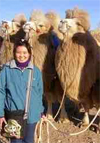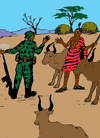Niche marketing of local livestock breeds

In December 2008, LPP held a writeshop in South Africa to develop a book on niche marketing of local livestock breeds.
Many local breeds are being replaced by high-yielding exotic breeds, pushing the local breeds to the brink of extinction. Yet the exotic breeds are expensive to keep and succumb quickly to disease if conditions are not exactly right. Local breeds, on the other hand, still produce meat or milk even if the rains fail and fodder is poor.
How to persuade livestock keepers to keep raising their hardy local breeds? One way is to find a market for their products: local food specialties such as cheese or meat, or distinctive handicrafts such as wool or leather work.
This writeshop, held in Kalk Bay, near Cape Town, discussed eight cases from Asia, Africa and Latin America where pastoralists and small-scale livestock keepers have succeeded in making money from their breeds.
A book describing the cases will be published by LPP in 2009.
Community conservation of Alashan camels in Inner Mongolia

Efforts by the Alxa Camel Conservation Association, an organization of camel herders in Inner Mongolia, in China, have halted the decline in numbers of the Alashan or Alxa, camel, a double-humped Bactrian breed.
Read Ilse Koehler-Rollefson’s report of their work for the DryNet initiative here.
Workshop on pastoralism and conservation

Pastoralists frequently come into conflict with conservationists who accuse them of causing overgrazing and soil erosion. But that is far from the truth, according to recent research. On the contrary, pastoralists are often custodians rather than destroyers of biodiversity and the environment.
LPP is organizing a workshop on “Enhancing the role of pastoralism in the conservation of dryland eco-systems” at the IUCN World Conservation Congress in Barcelona on 7 Oct 2008.
The evening workshop will feature presentations by pastoralists and experts with hands-on experience in India, Tanzania, Mongolia and Spain.
The workshop will provide pastoralist support groups with information and assistance in making their case, as well as give conservation practitioners insights into the role and potential of pastoralists in conserving drylands. The purpose is to distil some best practices about the integration of pastoralists into conservation efforts.
- Go to the previous page
- 1
- …
- 47
- 48
- 49
- 50
- 51
- 52
- 53
- …
- 76
- Go to the next page
